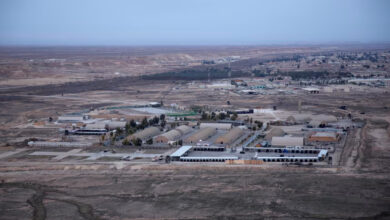Baghdad — Concerns over clashes in Bahrain between Shia protesters and security forces from Sunni Arab states spilled over into Iraq on Thursday as thousands of protesters converged on holy shrines in a show of Shia support and lawmakers debated how to respond.
An estimated 3000 people in Karbala, 90km (55 miles) south of Baghdad, gathered between the city's two Shia holy mosques in a demonstration that local councilman Hussein Shadhan al-Aboudi predicted will be dwarfed by even larger crowds after prayers on Friday. Parliament, meanwhile, discussed sending US$5 million in aid to Shias in Bahrain and demanded that the Arab League and the United Nations immediately intervene.
Former Prime Minister Ibrahim al-Jaafari, a Shia, also took a stab at what he called a tepid US response to the unrest against the tiny island's Sunni monarchy.
"The American stance on what is going on in Bahrain is indecisive and hesitant," al-Jaafari told a press conference in Baghdad. "Their response was timid, and that was not enough."
He also called on Iraqi Foreign Minister Hoshyar Zebari, a Kurd, to denounce Bahrain and the United Arab Emirates in letters to the Baghdad-based ambassadors of both nations. He suggested that Iraq recall its ambassador from Bahrain.
The UAE and Saudi Arabia, both Sunni-dominated countries, have sent forces to help Bahrain's monarchy subdue anti-government protests, held mostly by Shias.
Iraqi Prime Minister Nouri al-Maliki has said he fears clashes between forces and protesters could inflame sectarian violence across the Mideast. And two of Iraq's most prominent Shia clerics also have weighed in: Grand Ayatollah Ali al-Sistani on Wednesday called on Bahrain's government to cease the crackdown on protesters.
And Shia anti-American cleric Muqtada al-Sadr stoked the discontent, telling his followers in Baghdad and Basra to hold demonstrations in protest of the Saudi forces. Afterward, thousands of Sadrists rallied in their Baghdad stronghold of Sadr City and al-Sadr's supporters also protested Wednesday in Basra.
Parliament Speaker Osama al-Nujaifi urged calm and said all foreign parties should stay out of Bahrain's plight.
"We call on all to leave the Bahraini people — with all their ethnicities and social sects — to decide their fate by themselves without any intervention," al Nujaifi said.
Iraq has grappled with stemming its own sectarian tensions after years of tit-for-tat killings that brought the country to the brink of civil war in 2005-2008 between majority Shias and former Sunni ruling elite.
Also Thursday, a Sunni lawmaker said she escaped an assassination attempt as she headed to parliament. Lawmaker Etab al-Douri, a member of the Iraqiya alliance, said three gunmen shot four bullets at her armored car. The attackers fled before they could be captured, and al-Douri and her guards were not hurt.
Meanwhile, police and hospital officials said eight people were wounded Thursday by a bomb strapped to a bicycle in Mosul, 360km (225) northwest of Baghdad.
Violence has dropped dramatically in Iraq over the last three years, but deadly shootings and bombings still occur every day




